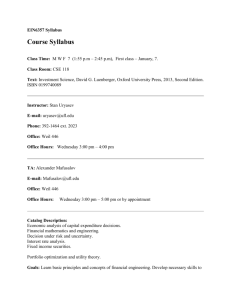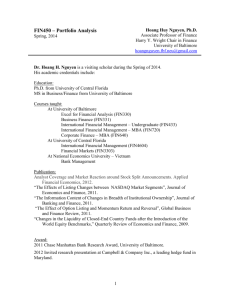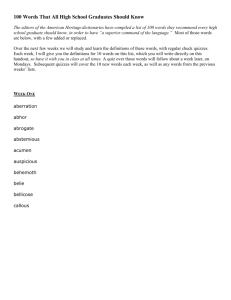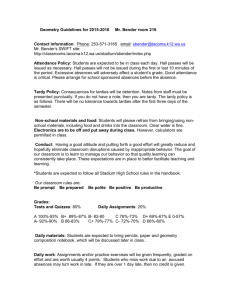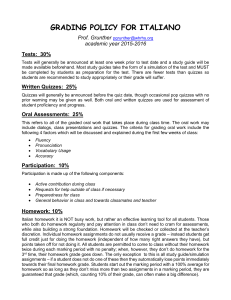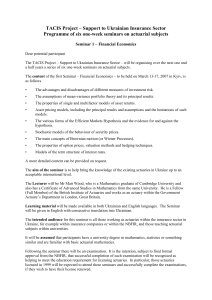Syllabus - University of Florida
advertisement
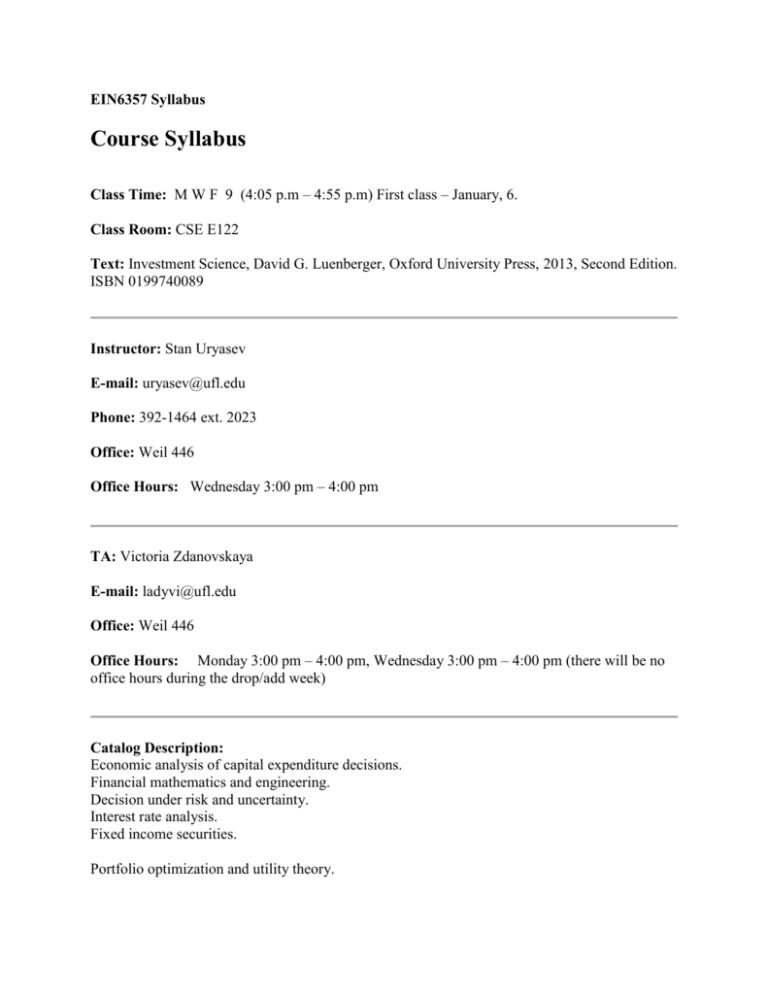
EIN6357 Syllabus Course Syllabus Class Time: M W F 9 (4:05 p.m – 4:55 p.m) First class – January, 6. Class Room: CSE E122 Text: Investment Science, David G. Luenberger, Oxford University Press, 2013, Second Edition. ISBN 0199740089 Instructor: Stan Uryasev E-mail: uryasev@ufl.edu Phone: 392-1464 ext. 2023 Office: Weil 446 Office Hours: Wednesday 3:00 pm – 4:00 pm TA: Victoria Zdanovskaya E-mail: ladyvi@ufl.edu Office: Weil 446 Office Hours: Monday 3:00 pm – 4:00 pm, Wednesday 3:00 pm – 4:00 pm (there will be no office hours during the drop/add week) Catalog Description: Economic analysis of capital expenditure decisions. Financial mathematics and engineering. Decision under risk and uncertainty. Interest rate analysis. Fixed income securities. Portfolio optimization and utility theory. Goals: Learn basic principles and concepts of financial engineering. Develop necessary skills to evaluate capital investment alternatives using economic concepts and time value of money. Acquire analytical and financial techniques for economic justification of decisions. Course Overview: This course is designed as an introduction to financial engineering theory and its applications. It focuses upon the fundamental principles of corporate finance and investment science such as cash flow streams, arbitrage, risk aversion, pricing of firms and finance instruments, interest rate term structure, fixed income instruments duration, bond portfolio immunization, and the Markowitz mean-variance portfolio theory. The text for the course presents the material in a very systematic way and has enough detail to convey the basic mathematical principles. The mathematics is not complex, but student should be comfortable with the use of mathematics as a method of deduction and problem solving. For instance, in a typical MBA course, the perpetual annuity formula might simply be presented, but in this course, it will be derived using elementary algebra. Why may this course be important to you? (1) Engineering is one of the better paid professions, especially, financial engineering; (2) personal reasons: saving to buy a car, home, putting children through college, be prepared for retirement, to become wealthy. Students are expected to be able to utilize PCs and MS Excel. Whenever it is possible, MS Excel spreadsheets will be used to illustrate the theoretical statements. This will help with the understanding of the material and strengthen computer skills. Course Topics: DETERMINICTIC CASH FLOW STREAMS 1. The basic theory of interest (principal and interest, present and future value of streams, internal rate of return, applications) 2. Fixed-income securities (CDs, Money Market Instruments, Treasury bills, bonds, mortgages, annuities, yield, duration, immunization, convexity) 3. The term structure of interest rates (yield curve, term structure, forward rates, expectations dynamics, running present value, floating rate bonds, duration, immunization) 4. Applied interest rate analysis (capital budgeting, optimal portfolios, dynamic cash flow processes, optimal management, the harmony theorem, valuation of a firm) SINGLE PERIOD RANDOM CASH FLOW STREAMS 1. Mean-variance portfolio theory (asset return, random variables, random returns, portfolio mean and variance, the feasible set, the Markowitz model, the two fund theorem, inclusion of risk free asset, the one-fund theorem) 2. The capital asset pricing model (market equilibrium, the capital market line, the pricing model, the security market line, investment implications, performance evaluation, CAPM as a pricing formula, project choice) 3. Models and data (factor models, CAPM as a factor model, arbitrage pricing theory, data and statistics, estimation of parameters, a multiperiod fallacy) 4. General principles (utility function, risk aversion, risk-neutral pricing) Dates of Quizzes: TBA Any absences whatsoever from tests and the final exam must be arranged with the instructor prior to the absence. Grading: 1. 6 Homeworks: 12% each 2. 7 In-Class Quizzes: 7% each 3. Attendance: 5% Lowest grades of two quizzes and one homework will be dropped. No make-up quizzes will be allowed. Comment: Final grade is based on 5 Homeworks, 5 Quizzes, and Attendance, totally 100%. Absences and Late Arrivals: Attendance will be taken. The final grade will be affected by frequent absences. Late arrivals will count as absences. Homework: Homework problems will be assigned in the beginning of each section. Late homework will not be accepted. The purpose of assigning regular homework is to enhance and test your mastery of facts and tools presented in the text and in class. It is essential to do homework regularly. Prerequisites: STA 4321. Prerequisites by Topic: Mathematical statistics, familiarity with operations research and optimization concepts, basic PC literacy, Excel. Honor Code: Please note, and adhere to, the following policy. "We members of the University of Florida community, pledge to hold ourselves and our peers to the highest standards of honesty and integrity".
